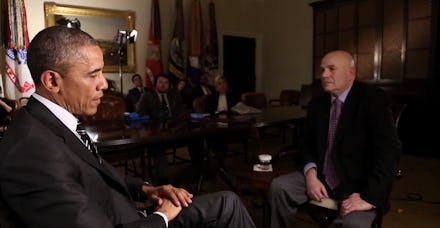Watch Obama Explain the Hidden Costs of the Drug War With the Creator of 'The Wire'

On Thursday, the White House released a video of President Obama discussing the war on drugs with David Simon, the creator of the critically acclaimed HBO show The Wire. The show depicts the war between law enforcement and drug cartels in Baltimore in the late 1990s and early 2000s, largely inspired by Simon's work as a journalist in the city in the 1980s.
Obama's chat began with almost boyish enthusiasm. He repeatedly declared himself a "huge fan" of the show, and told Simon he felt that "it's one of the greatest, not just television shows, but pieces of art in the last couple of decades."
The conversation then entered more familiar territory. Obama was wonky, thoughtful and technocratic in his describing the enormous toll the American criminal justice system has taken on urban communities nationwide.
His remarks lacked a moral reckoning with the wrongs posed by the effects of mass incarceration, a system that can prescribe life in prison without parole for selling $10 of marijuana. In his eyes, this is "counterproductive" and ineffective, rather than cruel and unusual. But ultimately, the conversation was substantive. It was as panoramic as The Wire itself, and Obama and Simon agreed that many truly fundamental changes in the country's attitudes and policies toward drugs are needed if the U.S. wants to undo decades of damage:
Obama and Simon discussed how they both personally witnessed how the war on drugs caused the criminal justice system to stray from its fundamental purpose.
"This was a time where people thought they could arrest their way out of a drug problem, and they actually tried to do that," said Simon.
Police departments diverted more and more of their limited resources from dealing with violent crime to chasing drug dealers and users. They amped up drug-related arrests, and prisons were flooded with nonviolent offenders. Simon explained that when he began working in Baltimore, the federal prison population was 34% violent offenders, but that by the time he left his job 13 years later, it was 7%.
Simon describes how, despite the fact that crime began to decline dramatically in the 90s, the prison population continued to grow dramatically. A greater and greater portion of people were being locked up for drug possession, and across the board people who encountered the criminal justice system faced more punitive sentencing.
Obama observed the debilitating effects of prison on the people who entered it.
"I saw this from the perspective of a state legislator, this explosion of incarcerations, disproportionately African-American and Latino." said Obama. "The challenge which you depict in your show is, folks go in at great expense to the state, many times trained to become more hardened criminals while in prison, come out and are basically unemployable, and end up looping back in."
Obama and Simon expressed mutual concern over the way that mass incarceration has ravaged communities across the nation, at the tragedy of a whole generation of youth growing up with parents reeling from a de-industrializing economy and dogged by the criminal justice system.
But Obama ended on an optimistic note about the possibility of reform.
"There is an increasing realization on the left, but also on the right, politically, that what we're doing is counterproductive," he said. "Either from a libertarian perspective, the way we treat nonviolent drug crimes is problematic, and from a fiscal perspective, it's breaking the bank. They end up spending so much more on prison than you would with these kids being in school or even going to college."